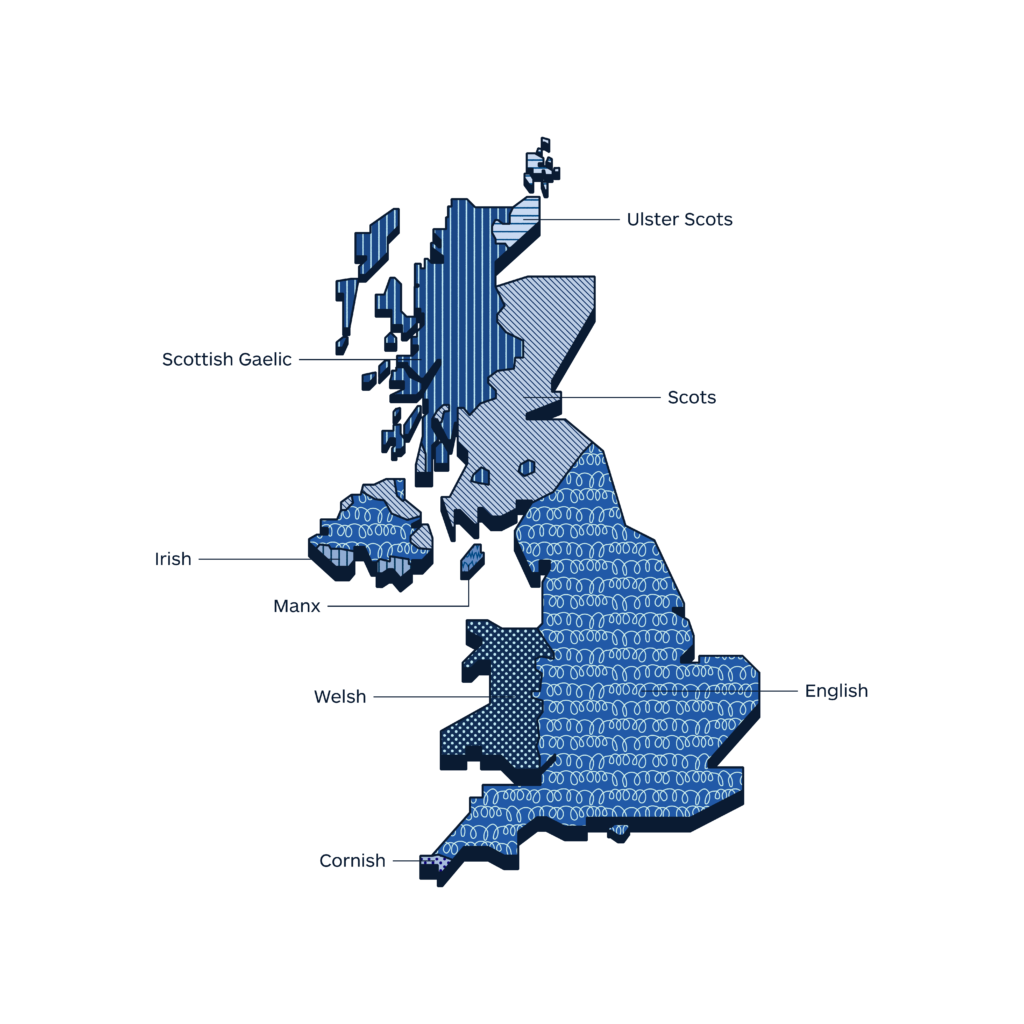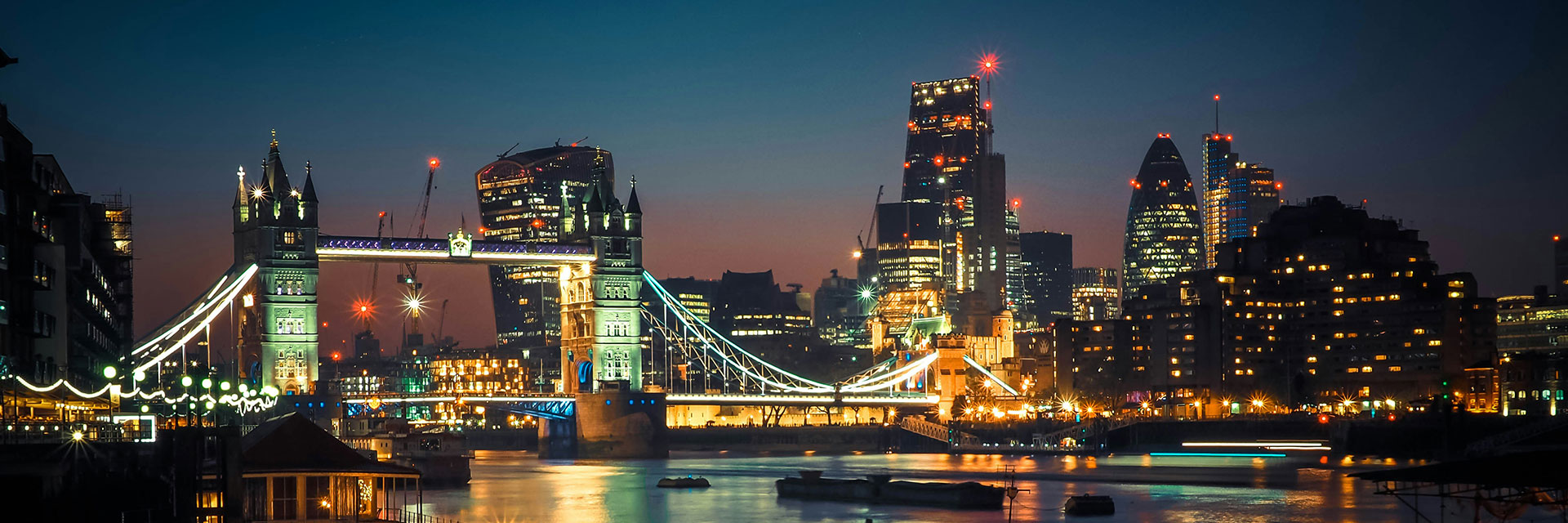Europe
To which language should you translate to localize in the United Kingdom?
What we know from our community
There are almost 40 different dialects in the UK, including famous ones like Brummie, Geordie and Cockney. But there is one language to be used for the UK and that is the standard UK or British English. Because of this melting pot of dialects, there are differences in meanings of certain words, which sometimes have to do with geography, but others are influenced by the British class system. For example, many people in the North of England would call their evening meal ‘tea’, where others in the South, would call it ‘supper’ or ‘dinner’ (though dinner is also used to mean ‘lunch’ in some places!).The important thing is to be consistent in the terms used that are commonly understood in the UK, even if some areas use regional words for certain things.
LANGUAGE INSIGHT
Official languages
English (97.3%; 66.5 mln), Welsh (0.9%; 615k), Scottish Gaelic (0.1%; 68k),
Actual languages
English (97.3%; 66.5 mln), Welsh (0.9%; 615k), Scottish Gaelic (0.1%; 68k), other (1.7%; 1.16 mln).
What the top 150 best localized websites in the world do in the United Kingdom
(Top 150 websites listed in the Global by Design ranking – published annually by Byte Level Research, this report provides a list of globally localized websites, showcasing best practices and emerging trends in their globalization)
- 141/150 localize by translating into English
- 2/150 localize by translating into both English and Welsh
- 1/150 localizes by translating into English, Welsh, Scottish Gaelic and British Sign Language
- 1/150 localizes by translating into both English and Romanian
- 1/150 localizes by translating into English, Romanian and Simplified Chinese
- 1/150 localizes by translating into English, French, German, Italian, Simplified Chinese, Korean, Japanese, Russian, Portuguese and Polish
- 1/150 localizes by translating into English, French, German, Italian, Spanish, Simplified Chinese, Traditional Chinese, Korean, Japanese, Russian and Portuguese
- 1/150 localizes by translating into English, French, German, Italian, Spanish and Simplified Chinese
- 1/150 localizes by translating into English, French, German, Italian, Spanish, Japanese, Polish, Portuguese, Arabic, Czech, Hungarian, Dutch and Swedish
-
3M
-
ABB
-
Accenture
-
Adidas
-
Adobe
-
Airbnb
-
Aldi
-
Amazon
-
American Airlines
-
American Express
-
Apple
-
Audi
-
Autodesk
-
Avis
-
Bayer
-
BMW
-
Booking.com
-
Bosch
-
British Airways
-
Bumble
-
Burberry
-
BYD
-
Canon
-
Capgemini
-
Cartier
-
Caterpillar
-
Chevrolet
-
Cisco Systems
-
Citibank
-
Coca-Cola
-
Costco
-
Dell
-
Deloitte
-
Delta
-
DHL
-
Disney+
-
Dyson
-
eBay
-
Eli Lilly
-
Emirates
-
Ernst & Young
-
Facebook
-
FedEx
-
Ford
-
Four Seasons
-
Fujifilm
-
GE
-
Gillette
-
GoDaddy
-
Google
-
Gucci
-
Haier
-
Heineken
-
Hermès
-
Hertz
-
Hilton
-
Hisense
-
Hitachi
-
Honda
-
Hotels.com
-
HP
-
HP Enterprise
-
HSBC
-
Huawei
-
Hyatt
-
Hyundai
-
IBM
-
IKEA
-
Intel
-
InterContinental Hotels
-
J&J
-
Jack Daniel's
-
Jehovah’s Witnesses
-
John Deere
-
Kellogg's
-
Kia
-
KPMG
-
L'Oréal
-
Land Rover
-
LEGO
-
Lenovo
-
Lexus
-
LG
-
Louis Vuitton
-
Lululemon
-
LUSH
-
Marriott
-
MasterCard
-
McDonald's
-
Mercedes-Benz
-
Merck
-
Microsoft
-
Mitsubishi Electric
-
Nestlé
-
Netflix
-
Nike
-
Nikon
-
Nintendo
-
Nio
-
Nissan
-
NIVEA
-
Oracle
-
Pampers
-
Panasonic
-
PayPal
-
Pepsi
-
Pfizer
-
Philips
-
Pitney Bowes
-
Porsche
-
Procter & Gamble
-
PWC
-
Revolut
-
Rolex
-
Royal Caribbean
-
Salesforce
-
Samsung
-
Sanofi
-
SAP
-
Sephora
-
Shopify
-
Siemens
-
Sony
-
Spotify
-
Starbucks
-
Steelcase
-
Stripe
-
Subaru
-
Tesla
-
The Church of Jesus Christ of Latter-day Saints
-
Tiffany
-
Tinder
-
Toshiba
-
Toyota
-
TripAdvisor
-
Uber
-
United Airlines
-
UPS
-
Visa
-
Volkswagen
-
Volvo Cars
-
Vrbo
-
Walmart
-
Western Union
-
Wikipedia
-
Wise
-
WordPress
-
Workday
-
Xerox
-
Xiaomi (Mi)
-
Zara
-
Zoom
If you need others information, below you can find a selection of economic/social/cultural data
Overview
Language
Official languages
English (97.3%), Welsh (0.9%) and Scottish Gaelic (0.1%).
T-index
3.4%
T-Index ranks countries according to their potential for online sales.
Other languages
Irish 0.1%, Punjabi, Bengali, Polish, Urdu, Gujarati, Chinese, Tamil, Arabic, Somali, Romanian, Italian and Turkish.
Most studied languages
French 23%. German 9%, Spanish 8%
Demography
Capital: London
Currency: Pound Sterling
Population: 68.35 million
Population density: 277/km2
Economy
GDP: 3.34 trillion USD (2023)
GDP per capita: 48,866.6 USD (2023)
Exports: $469 billion (2022)
Statistics
Internet users: 97.8% penetration, 66.33 million
Unemployment rate: 4.0% (2023)
Urbanisation: 84% (2022)
Literacy: 99% (2018)
Conventions
Numbering system
Arabic numerals and comma as decimal separator, space as thousands separator
Date format: yyyy-mm-dd / dd-mm-yyyy
Time: 24h time system
Country code: 0044
Language data sources: Worldatlas/Britannica//EF/Wikipedia; Demography data sources: IMF/Worldometers; Conventions data source: Wikipedia; Economy data sources: WTO/OEC/CIA/Esomar/Datareportal; Statistics data sources: Datareportal/WorldBank/UN/UNESCO/CEIC/IMF/Culturalatlas/Commisceoglobal
Facts and data
Economy
Imports
$747 billion (2022). Petroleum Gas ($57B), Cars ($40.3B), Crude Petroleum ($38.7B), Gold ($38.7B), and Refined Petroleum ($24.9B), importing mostly from China ($92.5B), Germany ($76.2B), United States ($75.4B), Norway ($59.1B), and Netherlands ($38.2B).
In 2022, United Kingdom was the world’s biggest importer of Preserved Meat ($858M), Tissue ($561M), Asphalt Mixtures ($388M), Ceramic Bricks ($308M), and Other Vegetable Residues and Waste ($158M).
Financial inclusion factors (over 15 years of age)
• 99.8% have an account with a financial institution
• 62.1% have a credit card
• 81% make online purchases
Ease of doing business
It is very easy to conduct business (rated 83.5 out of 100) ranked 5th out of 34 OECD high income countries and ranked 8th out of 190 countries worldwide (2023, World Bank).
Exports
$469 billion (2022). Gold ($32.1B), Cars ($29.4B), Gas Turbines ($29.2B), Crude Petroleum ($26.3B), and Packaged Medicaments ($20.3B), exporting mostly to United States ($61.8B), Netherlands ($41.9B), Germany ($40.6B), China ($35.4B), and Ireland ($32.6B).
In 2022, United Kingdom was the world’s biggest exporter of Hard Liquor ($9.58B), Horses ($643M), Collector’s Items ($452M), Scrap Nickel ($218M), and Scrap Lead ($89.3M)
Main local online stores
Amazon, Cdiscount.com and Fnac. Other top retail sites include eBay, Carrefour, Rakuten, Google Shopping, Leroy Merlin, La Redoute and Apple sites.
Economic freedom
‘Moderately free’ (rated 68.6 out of 100) ranked 17th out of 44 European countries and ranked 30th out of 176 countries worldwide (2024, Heritage Foundation and Wall Street Journal).
Global Innovation Index
Ranked 3rd out of 39 European countries, 4th out of 132 worldwide.
The Global Innovation Index captures the innovation
ecosystem performance of 132 economies and tracks the most recent global innovation trends.
Economy data sources: WTO/OEC/CIA/Esomar/Datareportal

Beyond Britannia
What's Imminent In UK
Each month, we spotlight a country with its own unique characteristics. Using analytical lens, we explore What’s Imminent in the linguistic, cultural, and economic tapestry to unveil its true character. Join us in this insightful exploration to understand the distinctive dynamics of each region.
Read it now!Service Imports (2019)
Service Exports (2019)
Source: OEC
Trade balance of goods from 2012 to 2022
Source: Statista
Historical Data Trade Imports
The following section uses historical trade data imports from partners of the United Kingdom.
Historical Data Trade Exports
The following section uses historical trade data exports from partners of the United Kingdom.
United Kingdom's Most Specialized Products
Specialization is measured using Revealed Comparative Advantage (RCA), an index that takes the ratio between the United Kingdom observed and expected exports in each product.
United Kingdom's Most Complex Exports
The Product Complexity Index (PCI) measures the knowledge intensity of a product by considering the knowledge intensity of its exporters.
Source: OEC
Perception of products made in selected countries in 2017
Source: Statista
Which attributes do you associate with products made in the UK?
Source: Statista
Market Growth Imports (2019)
This score represents the likelihood that the given country will start importing that product in the next few years. It forecasts the opening of a new specific market.
Market Growth Exports (2019)
This score represents the likelihood that the given country will start exporting that product in the next few years. It forecasts the opening of a new specific market.
Source: OEC
Foreign direct investment, net inflows (BoP, current US$)
Source: WorldBank
Most popular online stores in United Kingdom in 2018, by e-commerce net sales
(in million U.S. dollar)
What is your preferred online payment method?
Source: ecommerceDB.com
Source: Attest
Distribution of e-commerce payment methods in the United Kingdom in 2019
Source: Worldopay

T-index
Reach most of the online purchasing power
T-Index ranks countries according to their potential for online sales. It estimates the market share of each country in relation to global e-commerce.
Try it nowMedia
Media language: English
Information channels:
The UK has a strong tradition of public service broadcasting and an international reputation for creative programme-making. The fledgling BBC began daily radio broadcasts in 1922 and quickly came to play a pivotal role in national life. The Empire Service – the forerunner of the BBC World Service – established a worldwide reputation. The BBC is funded by a licence fee, which all households with a TV set must pay. Commercial TV began in 1955 with the launch of ITV. Commercial radio arrived in the 1970s, although ship-based stations flourished in the 1960s before being outlawed. Hundreds of privately-owned radio and TV stations now compete with the BBC for listeners and viewers. Home-grown soaps top the TV ratings, and many British viewers follow the ups and downs of life in East London’s Albert Square, the setting for the BBC’s EastEnders and Coronation Street – ITV’s soap about northern English working-class life. Reality TV shows attract large audiences. Once-dominant terrestrial TV networks face strong competition from digital satellite and cable, which offer hundreds of channels and digital terrestrial TV (DTT), which carries a smaller number of mainly free-to-air channels. Terrestrial digital radio (DAB) has had a slower start. The media are free and able to report on all aspects of British life. The variety of publications reflects the full spectrum of political opinion. In recent years, printed newspaper circulations have been sliding while online readership has surged. News Corp, owner of The Times through its News UK subsidiary, has spearheaded attempts to make money from online content by charging readers for access.
Press Regulation
In 2012, a judge-led inquiry recommended a new system of self-regulation for the press, backed by legislation. The inquiry followed a phone-hacking scandal at a News Corp title. Politicians agreed to set up a new watchdog with powers to impose heavy fines and force newspapers to publish corrections. In 2013, the system was backed by a Royal Charter, rather than by law. But the industry objected and said the Royal Charter plan would give politicians too much power. Most publishers have stayed outside the system.
The press
The Daily Telegraph – daily
Financial Times – daily, business
The Guardian – daily
The Independent – online, former print daily
The Times – daily
The Sun – daily tabloid
The Mirror – daily tabloid
The Daily Mail – daily tabloid
The Daily Express – daily tabloid
The Scotsman – Scottish daily
Western Mail – Welsh daily
Television
BBC TV – operates BBC1, BBC2 and digital services including BBC News channel
BBC World News – commercially-funded international news channel
ITV – major commercial network, organised around regional franchises
Channel 4 – commercially funded but publicly owned national station
Channel 5 – national commercial channel
Independent Television News (ITN) – supplier of news to ITV, Channel 4 and other outlets
Sky – operator of the Sky digital satellite platform and provider of films, entertainment channels and Sky News
Radio
BBC Radio – national services include contemporary music station Radio 1, adult music station Radio 2, cultural network Radio 3, flagship speech station Radio 4 and news and sport station Five Live
BBC Radio Scotland
BBC Radio nan Gaidheal – Gaelic-language station for Scotland
BBC Radio Ulster – for Northern Ireland
BBC Radio Wales
BBC Radio Cymru – Welsh-language
BBC Asian Network – for Asian communities in the UK
BBC World Service – major international broadcaster, heard worldwide via shortwave and on FM relays, programmes in more than 40 languages
LBC – commercial, news and talk
Absolute Radio – commercial, pop and rock
talkSPORT – commercial, sports
Classic FM – commercial, classical
News agency
Media data source: BBC
Internet Data
Internet users
97.8% penetration, 66.33 million
Share of web traffic by device
47.17% mobile phones, 48.62% computers (laptops and desktops), 4.10% tablet devices, others 0.11%.
Median speed of mobile Internet connection
48.43 Mbps
Average speed of fixed Internet connection
92.10 Mbps
Mobile connection as a percentage of total population: 131%
Percentage of mobile connections that are broadband (3G-5G): 99.3%
Most popular web search engines
Google (93.97%), Bing (3.7%), Yahoo! (1.29%), DuckDuckGo (0.55%), Ecosia (0.22%), other (0.27%).
Most used social media
Facebook (60.32%), Instagram (13.68%), Twitter (12.44%), Pinterest (6.41%), YouTube (2.57%), Reddit (2.26%), LinkedIn (1.75%), other (0.56%).
Internet data sources: Datareportal/Statcounter
Social statistics
Life expectancy
82 yrs (2022)
Current health expenditure
11.34% of GDP (2022)
Current education expenditure
97.7% of total expenditure in public institutions
Graduates (tertiary education)
In the United Kingdom, the average employment rate among tertiary-educated adults is 5 percentage points higher than among those with only an upper secondary or postsecondary non tertiary qualification. Nearly one-quarter of 25-64 year-olds (23%) have a bachelor’s degree, which is 5 percentage points above the OECD average. The proportion of adults with a master’s or doctoral degree is similar to the OECD average. (2019)
Cultural Curiosities
In the UK, humor, also referred to as banter, tends to be particularly sharp and sometimes a little over the line – it’s important not to take offense.
Be careful when crossing the street or driving in the UK, since it’s one of those countries where people drive on the left side of the road. Never stand on the left side of an escalator when using the metro unless you’re walking faster than others – the left side is for people who are in a rush.
Religion
The UK is very tolerant in terms of religion. The majority exist in relative harmony.
Gender
Gender equality is quite well established in the UK, though in some contexts women are still paid less (e.g. Wimbledon tennis champions) or excluded altogether (some conservative clubs). This is an issue that is challenged on a regular basis and can be discussed openly.
Class
Many would like to believe that this does not exist in the UK. Class does not necessarily go hand in hand with money; it has a lot to do with families and schooling etc. As a rule, it is not an issue in the workplace.
Ethnicity
On the whole, ethnicity is less of a social issue than it was 10 years ago. Racial incidents still do occur occasionally, but they are isolated.
Corruption perceptions Index
United Kingdom scored 73 out of 100, ranked 18th out 180 countries worldwide.
CO2 emissions
4.6 metric tons per capita
World Happiness Index
United Kingdom ranked 17 out of 137 countries, with a score of 6.943.
Social statistics sources: WorldBank/UN/UNESCO/CEIC/IMF
Country Curiosities
The National Dish of Britain Is Chicken Tikka Masala. It consists of marinated chicken pieces cooked in a creamy tomato-based sauce, blending Indian spices with British taste preferences. Despite its South Asian roots, it became a national dish due to the UK’s long history of Indian immigration, colonial ties, and the British love for curry. The dish reflects the multicultural nature of British cuisine. One legend claims it was invented in Glasgow when a chef added tomato sauce to dry chicken tikka to please a customer. Its rise symbolizes the fusion of cultures, uniting diverse culinary traditions in the UK.
Additionally…
- The UK is the sixth largest economy globally, after the USA, China, Japan, Germany, and India.
- Over 8 million people in London speak more than 300 languages.
- The UK is home to some of the oldest surviving Celtic languages, including Scottish Gaelic, Irish Gaelic, Cornish, Welsh, and Manx.
- The UK has over 40 distinct dialects.
- The UK is the second-largest exporter of television programming and the fourth-largest exporter of film content globally.
- French was the official language of the UK for 300 years.
- Brits drink 100–160 million cups of tea daily, totaling around 36 billion cups each year.
- Queen Elizabeth II, during her 70-year reign, visited over 100 countries without needing a passport.
- London was the first city in the world to have an underground subway system.
- 25% of London’s population was born outside the UK, making it one of the most diverse cities in the world.
The Data Factbook is a work in progress project. Our community is helping us to fill it up always with new and updated data. Your contribution is precious. If you want to help us, please write your advices at imminent@translated.com
Languages research
Languages spoken in the United Kingdom

Legend
-
Scottish
-
Ulster Scots
-
Scots
-
English
-
Manx
-
Irish
-
Welsh
-
Cornish
The language research that you will find in the maps published in this section is a work in progress. Our community is helping us to fill it up with always new and updated data. Your contribution is precious. If you want to help us, please write to imminent.factbook@translated.com
Photo credit: Alexander London, Unsplash


